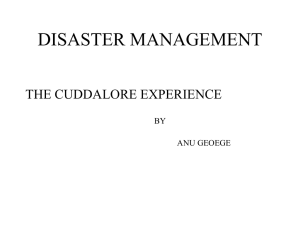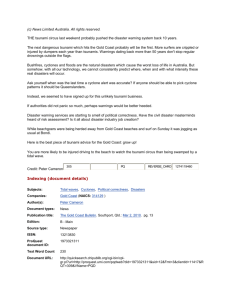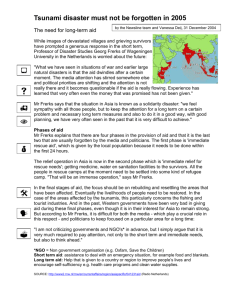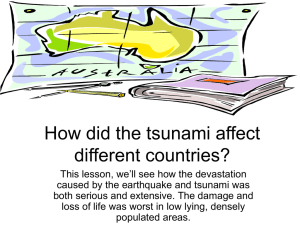Senate Committee on Foreign Relations Chairman Richard G. Lugar
advertisement
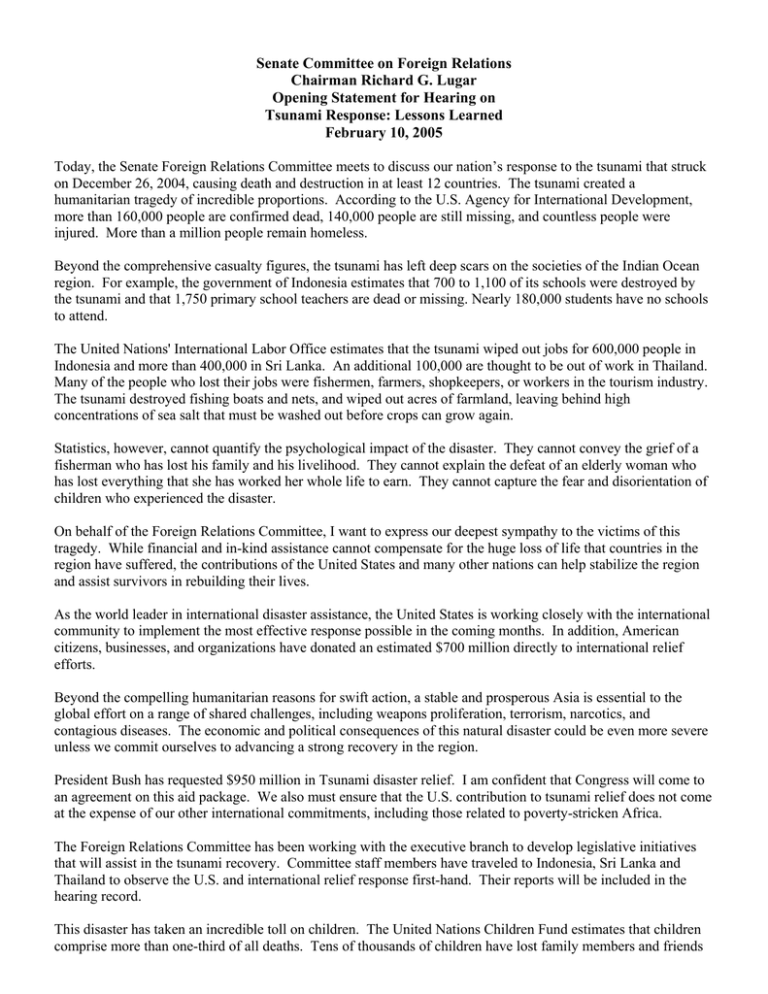
Senate Committee on Foreign Relations Chairman Richard G. Lugar Opening Statement for Hearing on Tsunami Response: Lessons Learned February 10, 2005 Today, the Senate Foreign Relations Committee meets to discuss our nation’s response to the tsunami that struck on December 26, 2004, causing death and destruction in at least 12 countries. The tsunami created a humanitarian tragedy of incredible proportions. According to the U.S. Agency for International Development, more than 160,000 people are confirmed dead, 140,000 people are still missing, and countless people were injured. More than a million people remain homeless. Beyond the comprehensive casualty figures, the tsunami has left deep scars on the societies of the Indian Ocean region. For example, the government of Indonesia estimates that 700 to 1,100 of its schools were destroyed by the tsunami and that 1,750 primary school teachers are dead or missing. Nearly 180,000 students have no schools to attend. The United Nations' International Labor Office estimates that the tsunami wiped out jobs for 600,000 people in Indonesia and more than 400,000 in Sri Lanka. An additional 100,000 are thought to be out of work in Thailand. Many of the people who lost their jobs were fishermen, farmers, shopkeepers, or workers in the tourism industry. The tsunami destroyed fishing boats and nets, and wiped out acres of farmland, leaving behind high concentrations of sea salt that must be washed out before crops can grow again. Statistics, however, cannot quantify the psychological impact of the disaster. They cannot convey the grief of a fisherman who has lost his family and his livelihood. They cannot explain the defeat of an elderly woman who has lost everything that she has worked her whole life to earn. They cannot capture the fear and disorientation of children who experienced the disaster. On behalf of the Foreign Relations Committee, I want to express our deepest sympathy to the victims of this tragedy. While financial and in-kind assistance cannot compensate for the huge loss of life that countries in the region have suffered, the contributions of the United States and many other nations can help stabilize the region and assist survivors in rebuilding their lives. As the world leader in international disaster assistance, the United States is working closely with the international community to implement the most effective response possible in the coming months. In addition, American citizens, businesses, and organizations have donated an estimated $700 million directly to international relief efforts. Beyond the compelling humanitarian reasons for swift action, a stable and prosperous Asia is essential to the global effort on a range of shared challenges, including weapons proliferation, terrorism, narcotics, and contagious diseases. The economic and political consequences of this natural disaster could be even more severe unless we commit ourselves to advancing a strong recovery in the region. President Bush has requested $950 million in Tsunami disaster relief. I am confident that Congress will come to an agreement on this aid package. We also must ensure that the U.S. contribution to tsunami relief does not come at the expense of our other international commitments, including those related to poverty-stricken Africa. The Foreign Relations Committee has been working with the executive branch to develop legislative initiatives that will assist in the tsunami recovery. Committee staff members have traveled to Indonesia, Sri Lanka and Thailand to observe the U.S. and international relief response first-hand. Their reports will be included in the hearing record. This disaster has taken an incredible toll on children. The United Nations Children Fund estimates that children comprise more than one-third of all deaths. Tens of thousands of children have lost family members and friends and are coping with unspeakable trauma. Nearly 35,000 children have been orphaned, and many more have been separated from their families. In addition to facing the risks of disease, hunger, and exposure, these children are vulnerable to being trafficked for sexual exploitation, forced labor, conscription, and other purposes. I would like to highlight three initiatives undertaken by this Committee that deal specifically with the problems faced by children and other vulnerable populations. First, today I am introducing a resolution urging the United States to ratify “The Protocol to Prevent, Suppress and Punish Trafficking in Persons -- Especially Women and Children” and the underlying “U.N. Convention Against Transnational Organized Crime.” United States ratification of these agreements would improve our ability to coordinate law enforcement efforts designed to protect children and vulnerable populations. We also must encourage other nations to ratify these agreements, which require parties to criminalize trafficking in persons and to cooperate with international law enforcement responses to trafficking. Second, today I will re-introduce “The Assistance for Orphans and Other Vulnerable Children in Developing Countries Act of 2005.” I originally introduced this bill in 2004. It would help address the consequences of the catastrophic growth in the number of children orphaned by AIDS and other causes. In sub-Saharan Africa alone, an estimated 14 million children have been orphaned by AIDS. This number is projected to soar to more than 25 million by 2010. The bill would support community based organizations assisting these children, reaffirm our commitment to the international school lunch program, develop ways to reduce school fees so that orphans are not forced to leave school because of cost, and promote the establishment and enforcement of inheritance rights for women and children. Although the bill is aimed at the AIDS orphan crisis, it would be applicable to orphans who lost their families in the tsunami disaster. I want to thank the five co-sponsors of this bill: Senators Boxer, Chafee, Coleman, Feingold, and Smith. They have been active in the bill’s development, and they have demonstrated an unwavering commitment to achieving a bipartisan success on this important bill. Third, Senator Biden and I are working on bipartisan legislation targeted at providing greater protections to women, children, and other vulnerable populations in the context of war or disaster. This is an issue of longstanding interest to Senator Biden, and he introduced the original “Women and Children in Conflict Protection Act” during the last Congress. We are consulting closely on how to craft a bill that would gain broad support within the Senate so that it could be passed during this session. The tsunami disaster has provided a tragic model of what can happen to women, children, the elderly, and the disabled in the aftermath of a disaster or conflict. These vulnerable populations face extreme risks during periods of instability or upheaval. In addition to threats from trafficking, abuse, and other predatory activities, vulnerable populations are sometimes blocked from assistance flowing to disaster areas by stronger or more politically connected groups. Our staffs witnessed this problem while traveling in the Indian Ocean region. I appreciate Senator Biden’s steadfast leadership on this issue and his commitment to getting this bill passed. I am hopeful that our hearing today will provide additional insights that can be applied to perfecting this legislation. Today we are joined by three distinguished panels. They will discuss the U.S. and international responses to the tsunami. On the first panel, we welcome the Senate Majority Leader, Senator Bill Frist, who has traveled to the Indian Ocean region to personally review relief efforts. On the second panel, we welcome Alan Larson, Under Secretary of State for Economic, Business, and Agricultural Affairs; Paul Wolfowitz, Deputy Secretary of Defense; and Andrew Natsios, Administrator of the U.S. Agency for International Development. We look forward to the insights of these three friends of the Committee into how their respective agencies are contributing to the U.S. relief effort. On our third panel we welcome Daniel Toole, Director of the Office of Emergency Programs at UNICEF; Mary McClymont, President and CEO of Interaction; and Nancy Lindborg, President of Mercy Corps. They will provide us with perspectives on the role of the United Nations and the NGO community. Thank you all for joining us today and for sharing your thoughts on what has been done in response to this disaster and what can be done better in the future. ###
